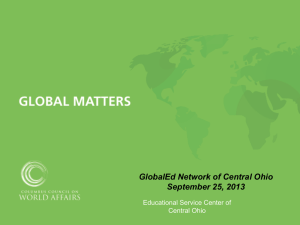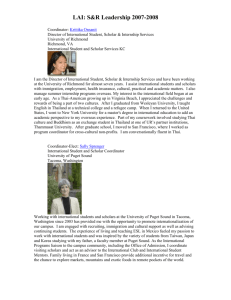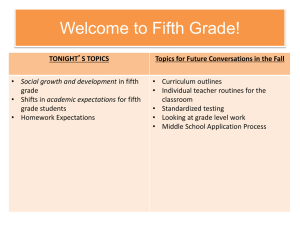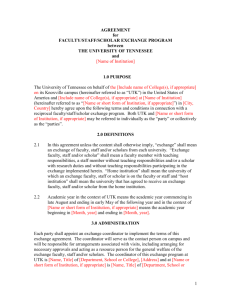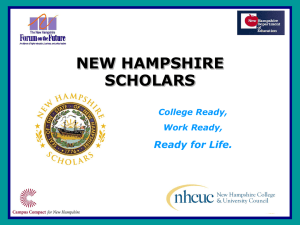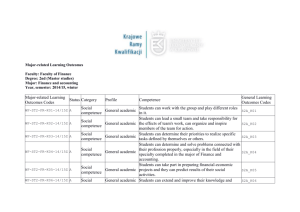Fifth Year Scholar Policies and Guidelines ()
advertisement
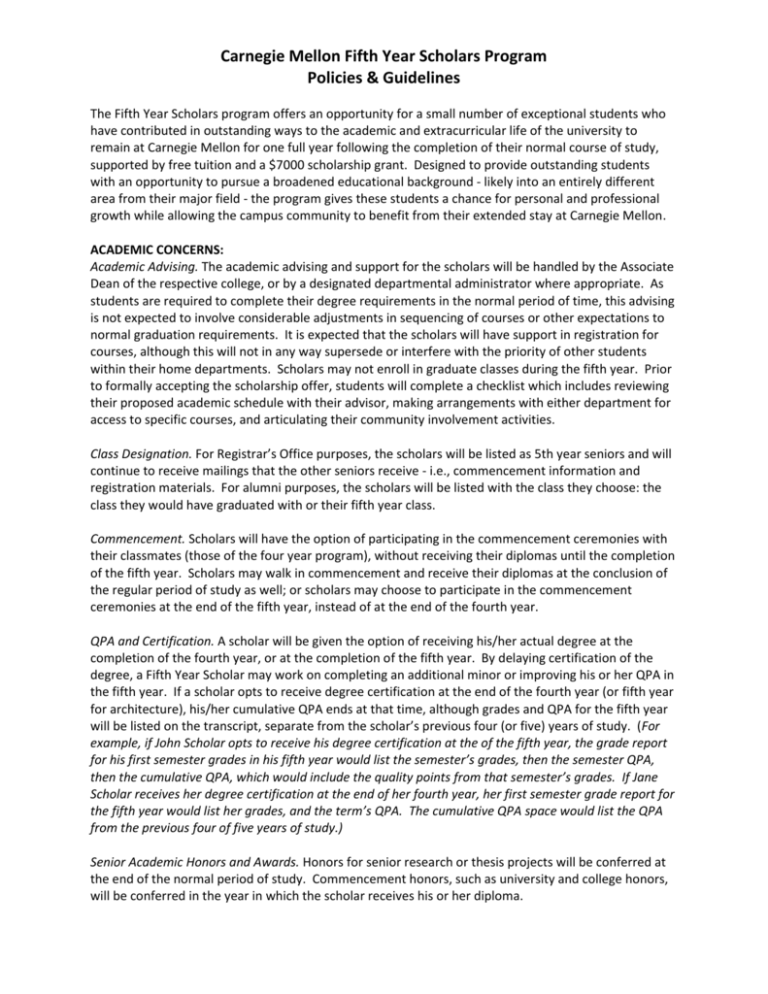
Carnegie Mellon Fifth Year Scholars Program Policies & Guidelines The Fifth Year Scholars program offers an opportunity for a small number of exceptional students who have contributed in outstanding ways to the academic and extracurricular life of the university to remain at Carnegie Mellon for one full year following the completion of their normal course of study, supported by free tuition and a $7000 scholarship grant. Designed to provide outstanding students with an opportunity to pursue a broadened educational background - likely into an entirely different area from their major field - the program gives these students a chance for personal and professional growth while allowing the campus community to benefit from their extended stay at Carnegie Mellon. ACADEMIC CONCERNS: Academic Advising. The academic advising and support for the scholars will be handled by the Associate Dean of the respective college, or by a designated departmental administrator where appropriate. As students are required to complete their degree requirements in the normal period of time, this advising is not expected to involve considerable adjustments in sequencing of courses or other expectations to normal graduation requirements. It is expected that the scholars will have support in registration for courses, although this will not in any way supersede or interfere with the priority of other students within their home departments. Scholars may not enroll in graduate classes during the fifth year. Prior to formally accepting the scholarship offer, students will complete a checklist which includes reviewing their proposed academic schedule with their advisor, making arrangements with either department for access to specific courses, and articulating their community involvement activities. Class Designation. For Registrar’s Office purposes, the scholars will be listed as 5th year seniors and will continue to receive mailings that the other seniors receive - i.e., commencement information and registration materials. For alumni purposes, the scholars will be listed with the class they choose: the class they would have graduated with or their fifth year class. Commencement. Scholars will have the option of participating in the commencement ceremonies with their classmates (those of the four year program), without receiving their diplomas until the completion of the fifth year. Scholars may walk in commencement and receive their diplomas at the conclusion of the regular period of study as well; or scholars may choose to participate in the commencement ceremonies at the end of the fifth year, instead of at the end of the fourth year. QPA and Certification. A scholar will be given the option of receiving his/her actual degree at the completion of the fourth year, or at the completion of the fifth year. By delaying certification of the degree, a Fifth Year Scholar may work on completing an additional minor or improving his or her QPA in the fifth year. If a scholar opts to receive degree certification at the end of the fourth year (or fifth year for architecture), his/her cumulative QPA ends at that time, although grades and QPA for the fifth year will be listed on the transcript, separate from the scholar’s previous four (or five) years of study. (For example, if John Scholar opts to receive his degree certification at the of the fifth year, the grade report for his first semester grades in his fifth year would list the semester’s grades, then the semester QPA, then the cumulative QPA, which would include the quality points from that semester’s grades. If Jane Scholar receives her degree certification at the end of her fourth year, her first semester grade report for the fifth year would list her grades, and the term’s QPA. The cumulative QPA space would list the QPA from the previous four of five years of study.) Senior Academic Honors and Awards. Honors for senior research or thesis projects will be conferred at the end of the normal period of study. Commencement honors, such as university and college honors, will be conferred in the year in which the scholar receives his or her diploma. FINANCIAL ISSUES: Charges. It is expected that the scholars will register and complete other requirements on time such that it will not be necessary to charge any late registration fees for scholars. If a scholar has an account balance from the semester prior to entering the fifth year, the student will be charged late fees accordingly. Financial Aid and Student Loan Status. Since scholars are considered full time students during the fifth year regardless of date of certification, student loan payments will be deferred until after the completion of the fifth year. Scholars will not be eligible for financial assistance or work-study positions on campus, although special arrangements might be possible with individual employers or departments. Financial Support. The indirect cost of advising and support from student affairs and the academic units will be absorbed by those units. The tuition for the fifth year will be waived. Support for living expenses of $7000 per student will be provided through outside funds. Costs for courses not covered by regular tuition (for example, books, music studio courses for non-majors, design studio fees, course fees for Pittsburgh Filmmakers, laboratory fees, etc.) are not explicitly covered through the scholarship. Prior to accepting the scholarship, candidates will complete the “Checklist” and will have the opportunity to formally request in writing additional funds from the scholarship fund to cover the costs of other expenses. Receipt of Scholarship. Scholars will receive their scholarship in the amount of $3500 each term of their scholarship year. Tuition Charges. No tuition is officially charged to the student. On the student’s bill, tuition and fees will be listed as “paid” or the balance will be listed as $0.00. The Registrar’s Office will be informed of scholars’ names and social security numbers by May 30th of the academic year preceding the scholars’ fifth year. NON-ACADEMIC: Administration. The administration of the program (including the selection process) will be handled through the Office of the Dean of Student Affairs. Community Impact Component. As Fifth Year Scholars are exemplary students who are active in the campus community and because the scholarship provides them with a unique opportunity for study and exploration, it is expected that scholars will impact the university through activities or a project designed to benefit the campus community. While specific kinds or types of involvement will not be dictated, there is a strong expectation that candidates for the scholarship program will articulate a project, program or series of activities of use or compelling interest to fellow students and other campus community members. Evaluation. An evaluation of the program will be conducted every other year with administrative support from the Office of the Dean of Student Affairs. The evaluation process will include assessments by academic and non-academic administrators and staff, faculty, and students (scholars and nonscholars). The evaluation will be used in making enhancement in the administration of the program and in ultimately determining whether or not to continue the program. Housing. Scholars will not be eligible for on-campus housing in keeping with the high priority placed on assigning all freshmen to spaces on campus. The scholars will be eligible for off-campus university housing. Students will be offered all other university student services. Organization. The scholars group will be established as an informal, unrecognized student organization that will include the scholars in the actual program and those selected but still completing their final year of regular study. This group will be expected to conduct some activities of an educational or developmental nature for their fellow students and other members of the campus community. (For example, a series of lectures or cultural activities). SELECTION PROCESS: Selection Criteria. The three main selection criteria for the scholarship are based on exceptional intellectual or artistic performance and promise, past and proposed metacurricular involvement and the student’s academic plans and community impact proposal. As the fifth year provides an exceptional opportunity for both the scholar and the campus, applicants should describe in detail the potential impact of the fifth year on their lives and the impact they will have on the campus community: how they, the campus community and possible other communities will be better for having been a scholar. The application process for the program will include an application review process and at least one round of interviews for select candidates. Through this process candidates will be given the opportunity to describe the impact Carnegie Mellon has had on their lives, as well as their plans for contributing to CMU. An academic and community impact proposal will be included in this plan. Dual-degree or double major programs will be allowed as a part of the program. Eligibility. Any student in their penultimate year of normal study (typically the third year) will be eligible to apply. Students will need to be on track to complete their degree requirements in the normal time and must complete all these requirements prior to beginning the program. Selection Process. Applications for the program will be solicited in November of the penultimate year of study. Candidates will be asked to submit a written personal statement concerning their qualifications for the Fifth Year Scholar program. Personal interviews will be conducted for finalists. The selection committee will include students, associate deans, and staff. Decisions will be announced in late April. Candidate Proposals. It is expected that each candidate will develop plans for the fifth year that will encompass their academic and professional goals and a detailed proposal for a significant contribution to the campus or Pittsburgh community. As community contribution is an integral program component, scholars are expected to study in Pittsburgh during their fifth year. Proposals which involve studying abroad or leaving the Pittsburgh vicinity for the fifth year are generally not viable, but will be considered on an individual basis. Specifics of Community Impact Proposals. This proposal should reflect the student’s perception of a compelling area of need or intriguing project and should allow him or her to pursue his/her interest. This project will be a great opportunity for a campus wide initiative or a program specific to the student’s college, and may encompass a research project, community involvement/service project, personal development activities, etc. Plan and Project Implementation Following Scholar Selection. Being accepted to the Fifth Year Scholars program does not guarantee implementation of a student’s academic plan or community involvement proposal. Rather, it is the student’s responsibility to assess the feasibility of his/her plans in consultation with the associate dean in his/her college or the coordinator of student academic services in his/her department, and personnel relevant to the success, feasibility and implementation of his/her proposals. Additionally, candidates accepted to the program will, by completing the “Checklist for Potential Fifth Year Scholars,” determine the feasibility of his/her plans and proposal prior to officially accepting the scholarship offer. Amendments and other considerations of these policies will be made through the cooperation of the departments primarily involved in the implementation of the policies and the Office of the Dean of Student Affairs, as the a primary administrator of the program. Revised January 2008. Updated June 2009.



